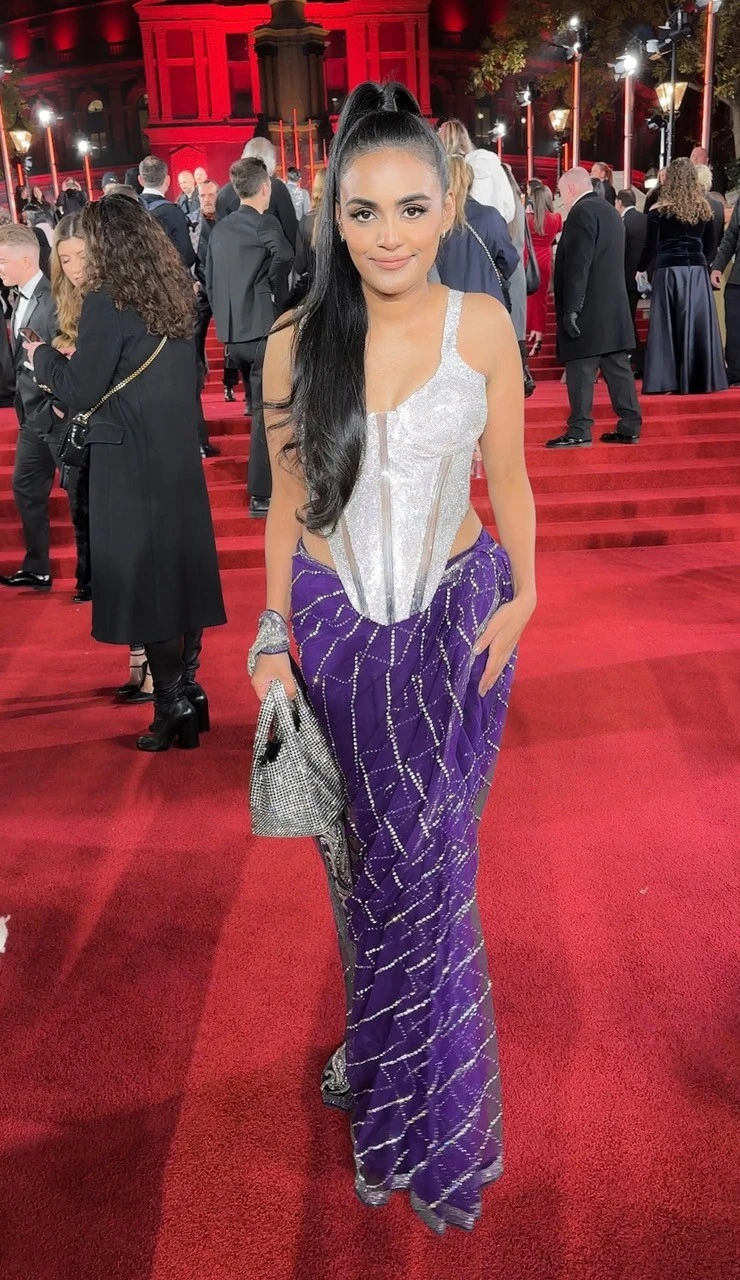(October 10, 2024) Nikita Karizma was a student at the London College of Fashion when the call came from Lady Gaga. The popstar, who is known for supporting young talent in fashion, wanted Nikita to style her. “It was a real ‘pinch me’ moment,” Nikita smiles. “There I was, heading off to Lady Gaga’s studio to drop off my student work.” It set the ball rolling on Nikita’s career as a designer and entrepreneur, and she caught the attention of the talent scouts, who were already keeping an eye out for talented students from the London College of Fashion. “Fashion stylists started communicating with me and began giving me orders for musicians,” Nikita says.
Nikita’s second big break came just as she graduated from the London College of Fashion, when she received a styling request from the UK’s biggest girl band, Little Mix. She used the money she earned to launch her own eponymous designer line, NIKITA KARIZMA. The designer has gone on to dress a galaxy of stars across Hollywood, the UK and Bollywood, including Kim Kardashian, Kylie Jenner and Shilpa Shetty. “I like seeing people spread a positive message,” she tells Global Indian, and that’s exactly what she helps them do through fashion. “Your style says a lot about who you are and what you stand for in the world.” Nikita has scaled up her business with a commercial line, KARIZMA, and recently purchased her first property to house her collections. To her, fashion is expression and empowerment combined, her style a fusion of understated Western influences and the bold, colourful cuts and prints of Indian design.

Nikita Karizma
A legacy in fashion
For as long as she can remember, Nikita Karizma’s life has been about fashion and textiles. She even recalls the day former Miss America Nina Davuluri, the first Indian-origin woman to hold the coveted title, walked into her mother’s store in London. “We dressed her too,” she says. “In one campaign, my mum had Aishwarya Rai before she became Miss World.” Her mother’s store specialised in wedding lehengas, and often styled celebrities for Asian magazines. The business of fashion was dinner-time conversation, and Nikita also began working for her parents early on. Even today, Nikita is at the intersection of creativity, entrepreneurship and profit, and of bridging her family’s rich, varied cultural heritage, with roots in India, Kenya and the UK.
Fashion is in her DNA, and the family has been in it for some six decades now. It began with Nikita’s grandparents, who ran their own clothing store in Kenya. When they migrated to the UK, they resumed operations there, specialises in Indian sarees, catering to the ever-growing Asian community in London. Although the family has strong ties to Kenya, Nikita was born and raised in the UK, growing up on London’s Ealing Road, “which feels like Mumbai,” she laughs. “A lot of immigrants live in this neighbourhood, you can hear Indian languages being spoken around you.”
Nikita began work young, helping her parents out at their London store. “I would meet customers, go on trips to do the buying and talk to sales people,” she says. They sold Indian clothes to the diaspora, making outfits for occasions like weddings. Her early exposure to fashion, therefore, came with strong ties to her Indian heritage, which she maintains to this day, although her own clothing lines are predominantly western. “People ask me why I didn’t launch an Indian fashion line, but my parents have already done that, and done it well. There was no need for me to duplicate what they were already doing.” To her surprise, she found orders pouring in from the South Asian community. “It was only when Bollywood stylists started requesting them that I realised how much my culture is part of me,” she says.

The celeb life
If Nikita were to claim a niche, it would likely be designing for musicians and pop stars. “I love celebrity and popular culture,” she says. “I love seeing music spread around the world like wildfire, especially when it spreads a positive message.” Her exposure to celebrity culture came fairly early, starting with her parents. When she was 16, Nikita began working for Sony TV as a presenter. “I was sent to music video sets and would interview celebrities.” She was very shy then, but used the opportunity to build confidence, going on to interview stars like Hrithik Roshan and Rakesh Roshan, Celina Jaitley and Rishi Rich. “I began to understand this world and also to understand celebrities as human beings,” she says. “It’s hard for them to connect with everyone but at the end of the day, everybody wants to be loved and understood.”
The business of design
A natural leader and entrepreneur, Nikita understood, by the time she went to college, the practicalities, the cash flows and the costs of running a fashion business. It stood her good stead. “A lot of designers go into fashion school and become very strong designers. But they don’t really train you on how to run a business at fashion school. For me, that came through my upbringing,” she says. When the time came for university, she chose the London College of Fashion.
The university was well-connected in industry circles and Nikita Karizma was still a bright-eyed student when she received a styling request that blew her away, from Lady Gaga. The popstar, who is known for supporting young designers, went on to be styled by Nikita.
Finding strength in diversity
Nikita knew at the outset that she wanted to have her own clothing line. She used the money she earned from the Little Mix commission to start her own business. Although it seems an obvious choice, considering her family’s line of work, Nikita was still a young, woman of colour trying to make a mark in the highly competitive, often cut-throat world of fashion. “In fashion school, I was the only Indian girl. When I go to networking events, I’m still the only Indian girl in the room. This was the case both in the UK and in America,” Nikita remarks. She found her “cultural creative tribe” in the Indian stylists who began reaching out to her. This was how her designer line, Nikita Karizma, came to be.

The young designer remained unfazed by the fact that she was different. “My family prepared me for it. They told me not to worry about being in a minority and to just focus on my talent and skillset,” she says, adding, “That’s the only thing which matters in the long term. Ultimately, it comes down to your product.” These were also the early days of social media, and influencers weren’t really a thing. “It wasn’t a desirable career path and a job. People didn’t understand the path I had taken.” This was also before the world had taken to posting every detail of their lives on social media. With very little documentation, the fashion industry remained insulated from the rest of the world. Things have come a long way since, and now, being a fashion designer is a highly sought-after job. “These days, when I post videos of what I do at work, they are seen as aspirational. But it’s also a saturated and competitive market,” she says. She kept her head down and focussed on her skillsets, and on creating the best products. “Ultimately, if your work is good, people want to wear them. As long as that happens, I know I can carry on in the long term.”
- Follow Nikita Karizma on Instagram




